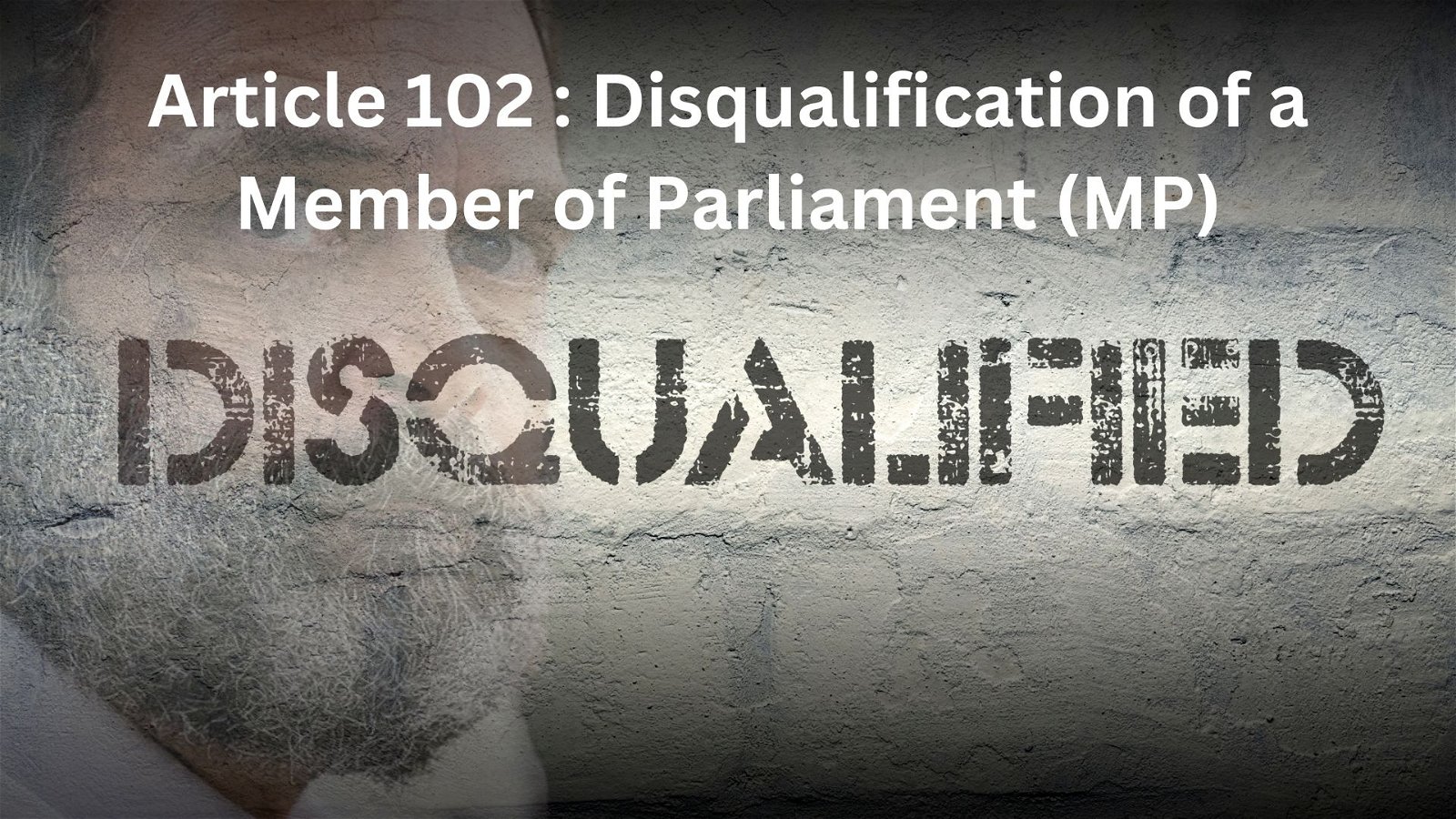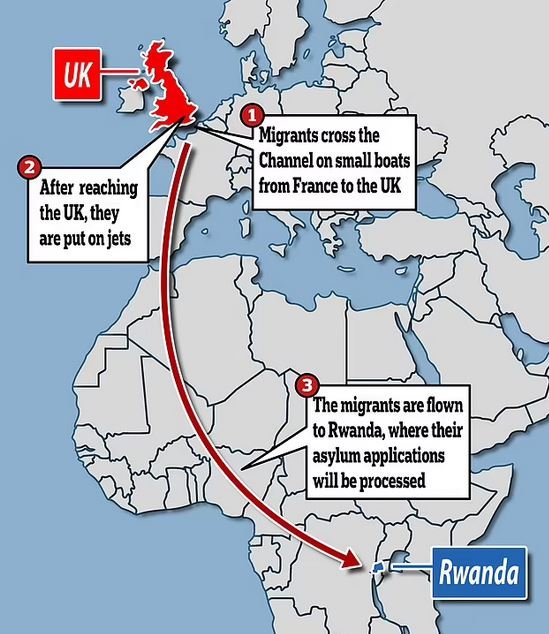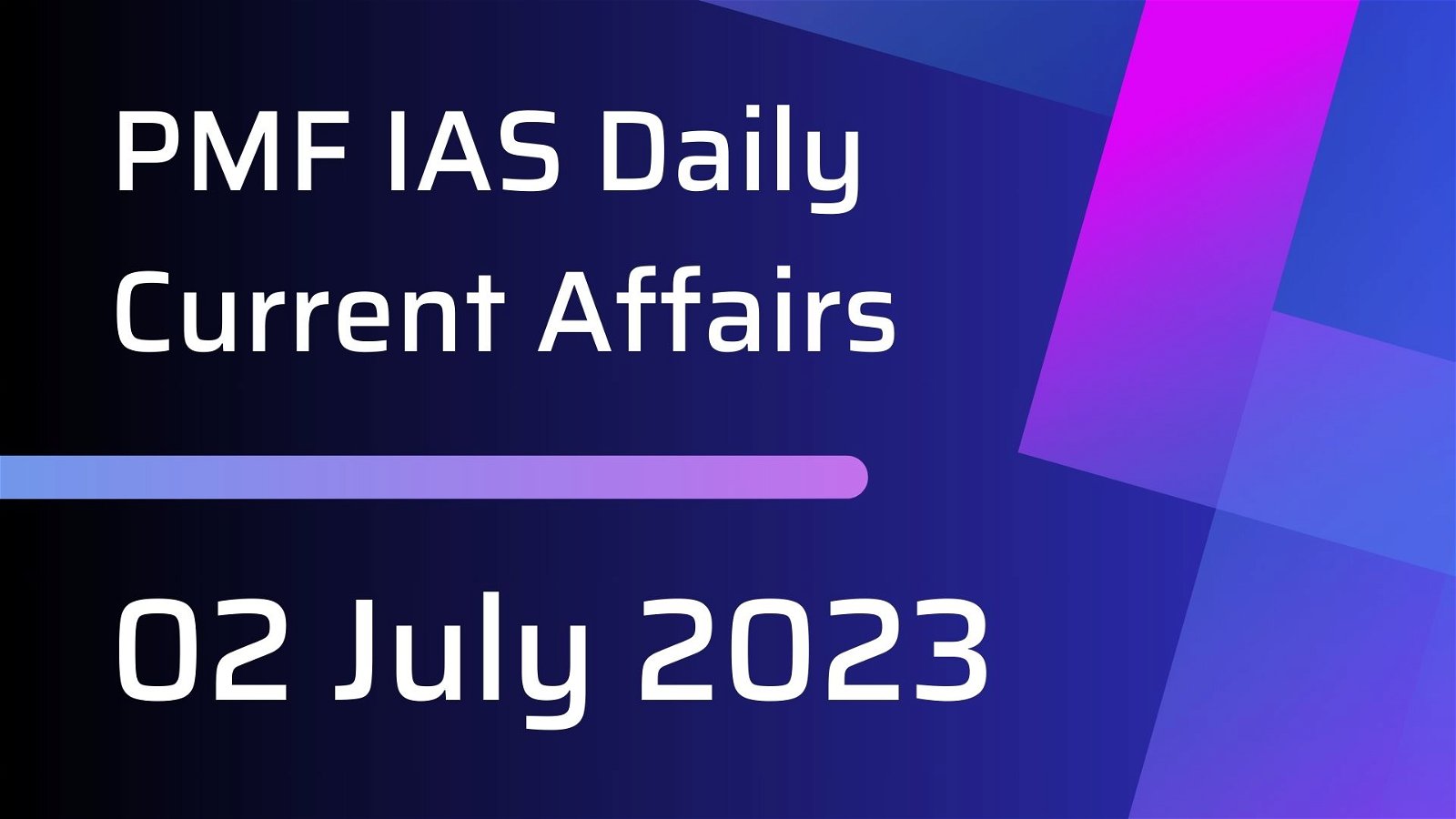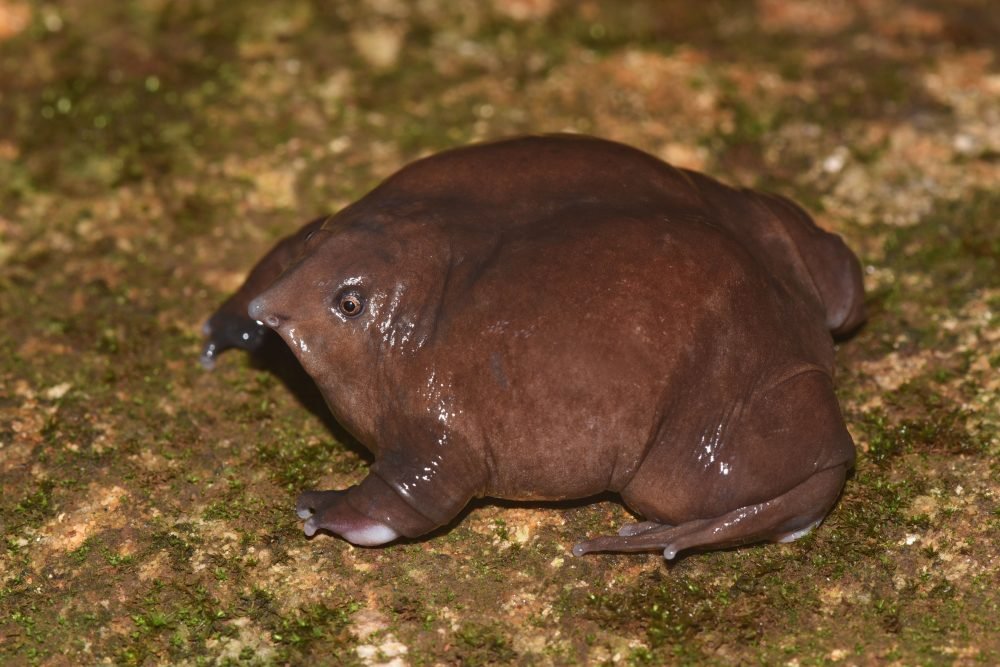
Current Affairs August 05, 2023: Lokmanya Tilak Award, Appointment of Vice-Chancellor, PM SVANidhi, Privilege Motion, Disqualification of MP, GI Tag
Subscribers of "Current Affairs" course can Download Daily Current Affairs in PDF/DOC
Subscribe to Never Miss an Important Update! Assured Discounts on New Products!
Must Join PMF IAS Telegram Channel & PMF IAS History Telegram Channel
{GS1 – MIH – Personalities – 2023/08/05} Lokmanya Tilak Award
- Context (TH): The Lokmanya Tilak National Award was given to PM Modi in Pune on August 1st in honour of his outstanding leadership and for inspiring a sense of patriotism among Indians.
- The award was instituted in 1983 by the Tilak Smarak Mandir Trust.
- The Trust gives this prestigious award each year on the anniversary of Lokmanya Tilak’s passing.
- PM Narendra Modi, has been selected as the 41st recipient of this award.
- Scientist Tessy Thomas (known as India’s “missile woman”) received the award the year before for boosting defence capabilities as the project director for the Agni-4 and Agni-5 missile systems.
- The other major recipients of the Lokmanya Tilak Award include:
- Indira Gandhi
- Atal Bihari Vajpayee
- Sharad Pawar
- Rahul Bajaj
- Cyrus Poonawalla
- Manmohan Singh
Bal Gangadhar Tilak (Lokmanya Tilak)

- Tilak was born on 23rd July 1856 in Ratnagiri, Maharashtra.
- He passed away on 1st August 1920, just before the launch of the Non-Cooperation Movement.
- Ideology
Nationalist Revolutionary
- Tilak was a revolutionary nationalist and extremist leader.
- He preached the message of self-respect, Swadeshi, and Swarajya (self-rule).
- He stressed that there could be no progress without self-rule (swarajya).
- He was against social reforms through the British, he believed that social reforms should be done after getting self-rule. This view of him caused him to oppose the ‘age of consent act’ of 1891.
- He publicly supported the efforts to assassinate Presidency Magistrate Douglas Kingsford in 1908.
- Mahatma Gandhi called him The Maker of Modern India, while Jawaharlal Nehru described him as The Father of the Indian Revolution (Unrest).
Devout Hindu
- Tilak was a devout Hindu who advocated for cultural and religious revival and used Hindu scriptures to inspire people to fight oppression.
- He popularized Ganesh Chaturthi and propounded the celebration of Shiv Jayanti on the birth anniversary of Chhatrapati Shivaji to propagate nationalist ideas and a sense of national identity.
- He also started akharas, lathi clubs, and anti-cow killing societies.
Swadesh
- Swadeshi Wastu Pracharini Sabha was started by Tilak in 1905.
- It aimed to start certified Swadeshi shops.
-
Contribution Towards Education
- Tilak and others started the New English School (1880) in Pune.
- He and his associate Gopal Ganesh Agarkar founded the Deccan Education Society (1884).
- He is among the founders of Fergusson College (1885), Pune.
- The New English School and the Fergusson College functioned under Deccan Education Society.
- Tilak and his associates considered English to be a powerful tool for the dissemination of liberal and democratic ideals.
-
Books by Tilak
- The Orion, Or, Researches Into the Antiquity of the Vedas (English)
- The Arctic Home in the Vedas (English; about the origins of the Indo-Aryan people)
- Gita Rahasya (Marathi; authored in 1915 while he was in prison at Mandalay, Burma. According to him, the real message behind the Bhagavad Gita is Nishkam Karmayoga (selfless action), rather than Karma Sanyasa (renouncing of actions))
-
Freedom of the Press
- Tilak started two newspapers in 1881:
- Kesari (Marathi)
- The Mahratta (English)
- Tilak started two newspapers in 1881:
Sedition Charges
- He had been tried for sedition charges thrice by British Indian Government— in 1897, 1908 & 1916.
- Tilak’s activism, appealing to Hindu symbolism and Maratha history, excited the populace and brought him into conflict with the British government.
- His articles criticising the British government’s handling of the plague epidemic in Pune inspired the Chapekar brothers to assassinate Commissioner Rand and Lt. Ayerst in 1897.
- He was sentenced to 18 months of imprisonment in 1897.
- His prosecution for sedition gained him more popularity, earning him the title Lokamanya (”Beloved Leader of the People”).
- In 1909, he was charged with sedition for racial animosity between Indians and the British. Muhammad Ali Jinnah appeared in Tilak’s defence but was sentenced to six years in prison in Burma.
- In 1916, he was again charged with sedition over his lectures on self-rule, but was acquitted.
-
Tilak and Indian National Congress (INC)
- Tilak joined the INC in 1890 and opposed its moderate attitude, supported Radical revolution.
- Following the Partition of Bengal, by Lord Curzon to weaken the nationalist movement, Tilak encouraged the Swadeshi movement and the Boycott movement.
- Lal-Bal-Pal: Tilak opposed the moderate views of Gopal Krishna Gokhale and was supported by nationalists Bipin Chandra Pal in Bengal and Lala Lajpat Rai in Punjab.
- In 1907, INC session was held at Surat, Gujarat, Trouble broke on the selection of the president.
- The party split into the radical faction and the moderate faction.
-
Home Rule League
- The Home Rule movement was started to get a Self-government (Dominion status).
- It was established in 1916 as The All-India home rule league similar to the Irish home rule league as a political organisation.
- The term dominion means “that which is mastered or ruled”.
- It is referred to those countries which were earlier part of the British Empire but had their own governments i.e., self-governing nations of the British Empire.
- There were two home rule leagues, one established by Tilak and the other by Annie Besant.
Feature Tilak’s Home Rule League Annie Besant’s Home Rule League Founded April 1916 at Poona
September 1916 at Madras
Area of operation Maharashtra, Central Province, Berar and Karnataka Rest of India, including Bombay Membership 6 branches 200 branches
Ideology Extremist Moderate Demands Dominion status for India Methods Public meetings, pamphlets, newspapers, boycotts Government response Tilak was barred from entering Delhi and Bombay Besant was arrested Impact Helped to awaken the political consciousness of the Indian people - Both the key leaders realised the importance of integration of the moderates and the extremists.
- Annie Besant launched a campaign in 1915 by her newspapers the New India and Commonweal.
- In the 1916 session, the Extremists were admitted to Congress but due to Congress’s non-agreement on the home rule and the revival of the local-level congress committee, Annie was forced to start her own movement.
- A separate league was set up by Annie and Tilak to avoid any Ideological differences.
- Muslims, Anglo Indians, and non-Brahmin didn’t join, because they felt Home rule meant Hindu majority rule and that too high caste.
- In 1920 it was merged with Congress to form a united front against the British government
- In 1921 the All-India Home Rule League changed its name to Swarajya Sabha.
{GS2 – Higher Education – Issues – 2023/08/05} VCs of State Universities
- Context (TH): West Bengal passes Bill reconstituting search panel for appointment of VCs.
- It reconstituted the search-cum-selection committee for the appointment of Vice-Chancellors (VCs) of the universities in the State.
- The search-cum-selection committee will now have nominees of:
- Chancellor
- Chief Minister
- University Grants Commission (UGC)
- State government
- The Chairman of West Bengal State Council of Higher Education.
- Earlier, the search committees had three nominees which included nominees of the Chancellor, State government and the university.
UGC Regulations (2018) on the appointment of Vice-Chancellor
- The person to be appointed as a Vice-Chancellor should be a distinguished academician, with a
- minimum of ten years’ of experience as Professor in a University or
- ten years’ of experience in reputed research.
- The selection for the post of Vice-Chancellor should be through proper identification by a Panel of 3-5 persons by a Search-cum-Selection-Committee.
- One member of the committee shall be nominated by the Chairman of UGC.
- The members of Search-cum-Selection Committee shall be:
- The persons’ of eminence in the sphere of higher education, and
- Shall not be connected in any manner with the University concerned or its colleges.
State universities and Power of Chancellors
- State public universities are established through laws passed by state legislatures.
- In most laws the Governor has been designated as the Chancellor of these universities.
- The Chancellor functions as the head of public universities, and appoints the Vice-Chancellor of the university.
- In 1997, the SC held that the Governor was not bound by the aid and advice of the Council of Ministers, while discharging duties of a separate statutory office (such as the Chancellor).
State act and UGC regulations
- Supreme Court held that the appointment of Vice Chancellor of A University Even Under A State Legislation Cannot Be Contrary To UGC Regulations.
Recommendations of commissions
- Sarkaria and Punchhi Commissions dealt with the role of the Governor in educational institutions.
- Both Commissions concurred that while discharging statutory functions, the Governor is not legally bound by the aid and advice of the Council of Ministers.
- Both commissions recommended that state legislatures should avoid conferring statutory powers on the Governor and the role of the Governor should be restricted to constitutional provisions.
Recent developments
- Recently, some states have reduces the oversight of the Governor in state public universities.
- The West Bengal University Laws (Amendment) Bill, 2022 designates the Chief Minister of West Bengal as the Chancellor of the 31 public universities in the state.
- The Tamil Nadu Legislative Assembly passed two Bills, to transfer the power of appointing the Vice-Chancellor (in public universities) from the Governor, to the state government.
- In 2021, Maharashtra amended the process to appoint the Vice Chancellor of state public universities.
- The Punjab Assembly passed the Punjab University Laws (Amendment) Bill 2023, vesting the powers of Chancellors of State Universities with the CM.
{GS2 – Higher Education – Laws – 2023/08/05} IIM (Amendment) Bill, 2023
- Context (IE I TP): Central government’s proposed changes to the IIM Act have triggered concern that they could erode the autonomy of the IIMs.
Indian Institutes of Management (IIMs)
- The IIMs are premier management institutes dedicated to imparting high-quality management education and training, research, and consultancy services.
- IIM-Calcutta was the first IIM, established in 1961. Currently, there are 20 IIMs in the country.
- The IIM Act, 2017 provides for the creation of an academic council for each IIM.
- The academic council decides the academic content, criteria and processes for admissions to courses and guidelines for the conduct of examinations.
Indian Institutes of Management (Amendment) Bill, 2023
-
Appointment of the Director
- The bill seeks to amend the IIM Act, 2017, to give GoI an expanded role in the appointment of the IIM Director. It requires the IIM’s Board to obtain prior approval of the President before appointing the Director.
- The Director is currently appointed from the pool of names recommended by a search-cum-selection committee which is constituted by the IIM’s Board.
-
Visitor of Institute
- The bill proposes that the President of India will be the “Visitor of every IIM Institute“.
- The Visitor will have the power to make appointments, audit the working of institutions, and conduct an inquiry.
- The bill also proposes that the Selection Committee of Directors should have one member nominated by the Visitor and only two other “eminent” members.
- The bill seeks to take away the power of appointment of the Chairperson from the Board and to instead make the Chairperson a nominee of the President.
-
Why has the government proposed these amendments?
- GoI has proposed these amendments in response to differences of opinion with the IIMs on several key appointments.
- GoI also wants to bring the IIMs in line with other central universities and IITs, where the President is the Visitor and appoints the vice-chancellors and directors.
{GS2 – MoHUA – 2023/08/02} PM SVANidhi
- Context (IE): MoHUA has set a target for its loan scheme PM SVANidhi for street vendors which is 63 lakh new loans in less than six months till December 2023.
- Prime Minister Street Vendor’s AtmaNirbhar Nidhi (PM SVANidhi) is a Central Sector Scheme i.e., fully funded by the Ministry of Housing and Urban Affairs (MoHUA).
- The scheme has the following objectives:
- To facilitate working capital loans up to Rs. 10,000
- To incentivize regular repayment; and
- To reward digital transactions
-
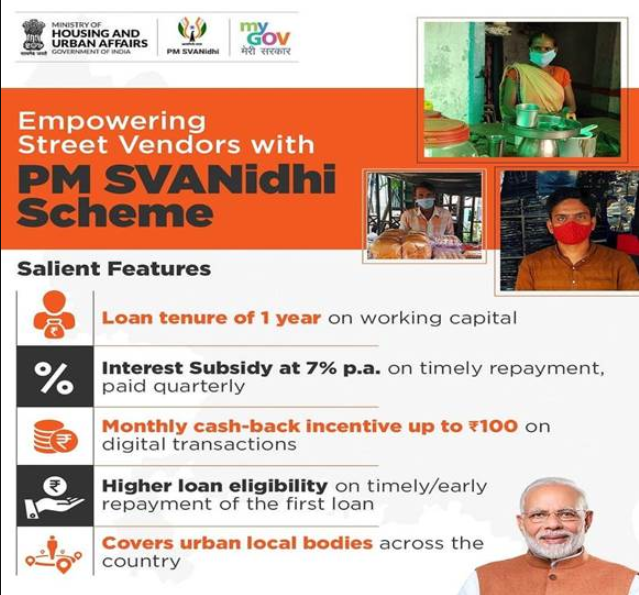
- The Scheme is available for beneficiaries belonging to only those States/UTs which have notified Rules and Scheme under the Street Vendors (Protection of Livelihood and Regulation of Street Vending) Act, 2014.
- Vendors can avail a working capital loan of up to Rs. 10,000, which is repayable in monthly instalments in the tenure of one year.
- On timely/early repayment of the loan, an interest subsidy @ 7% per annum will be credited to the bank accounts of beneficiaries through Direct Benefit Transfer on a quarterly basis.
- There will be no penalty on early repayment of the loan.
- The scheme promotes digital transactions through cash-back of upto Rs. 100 per month.
- The vendors can avail the facility of escalation of the credit limit on timely/early repayment.
- It is Implemented by the Small Industries Development Bank of India (SIDBI).
-
Small Industries Development Bank of India (SIDBI)
- SIDBI is set by an Act of Parliament, acts as the Principal Financial Institution for the Promotion, Financing and Development of the MSME sector or similar activities.
- It is under the jurisdiction of the Ministry of Finance.
- The SIDBI was established in 1990, by the GoI, as a wholly-owned subsidiary of IDBI Bank.
- It was delinked from IDBI w.e.f. March 27, 2000.
- SIDBI is active in the development of Micro Finance Institutions (MFI) through the SIDBI Foundation for Micro Credit.
- The Shares of SIDBI are held by the GoI and 22 other institutions/public sector banks/insurance companies owned or controlled by the Central Government.
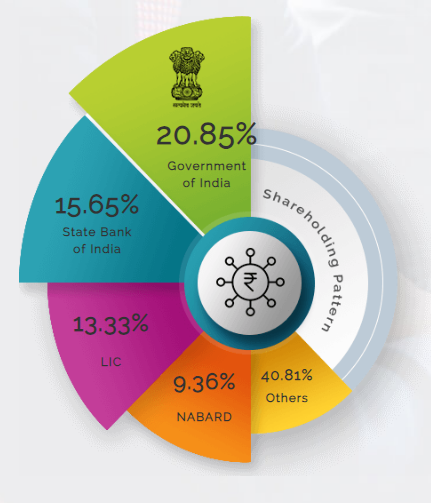
-
The Bank executes its mandate through-
- Indirect Lending: Based on multiplier effect/ larger reach in financing the MSME sector and is undertaken through Banks, SFBs, NBFCs, MFIs and New Age FinTechs.
- Direct Lending: aims to fill the existing credit gaps in the MSME sector through the innovative credit delivery ecosystem.
- Fund of Funds: boosts entrepreneurship culture by supporting emerging startups through the Fund of Funds channel.
- Promotion and Development: promoting entrepreneurship and handholding budding entrepreneurs for holistic development of the MSME sector through credit-plus initiatives.
- Facilitator: playing a facilitator through roles like Nodal Agency for the MSME-oriented Schemes of the Government.
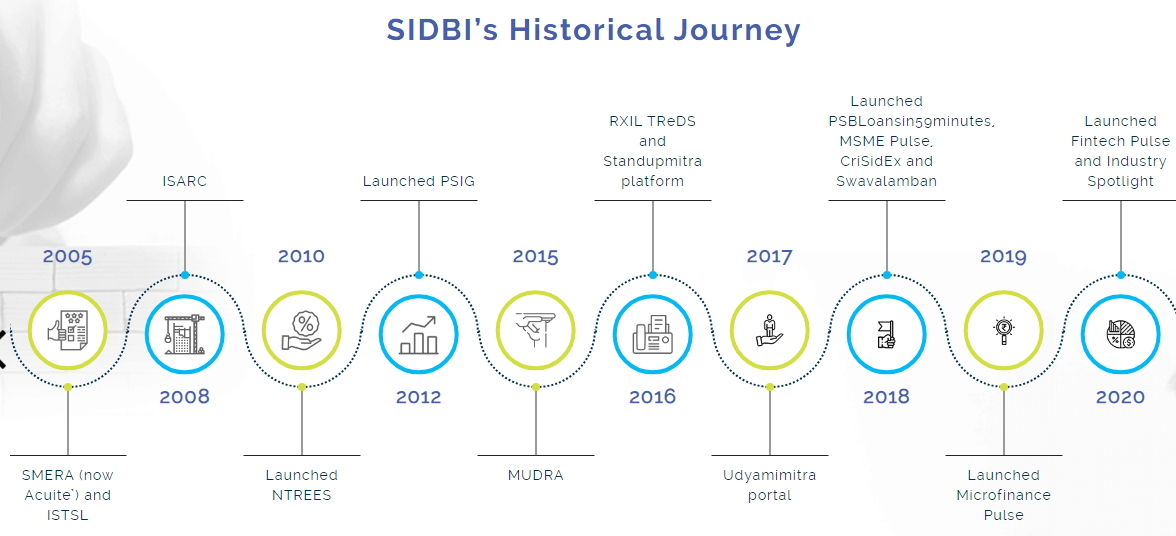
{GS2 – Polity – IC – Parliament – 2023/08/05} Privilege Motion
- Context (IE): Rajya Sabha Chairman referred complaints related to the privilege of the House against TMC’s Derek O’Brien and AAP’s Raghav Chadha to the privileges committee.
- Parliamentary privileges are certain rights conferred to the Members of Parliament for conducting the business of the Parliament.
- There is no codified list of the exact privileges, but it includes:
- Freedom of speech in the course of Parliamentary debates.
- Members of Parliament will not be liable for court proceedings for this.
Procedure
- If there is a belief that a privilege has been breached, a motion can be raised by any member.
- A member wishing to raise a question of privilege shall give notice in writing to the Secretary-General before the commencement of the sitting of the day.
- The Chairman may or may not give consent to raise a question of privilege.
- Chairman may refer any question of privilege to the Committee of Privileges or Council may consider the question and come to a decision.
Conditions of admissibility
- The question shall be restricted to a specific matter of recent occurrence.
- The matter requires the intervention of the Council.
Mandate of the committee
- The Committee examines every question and “makes such recommendations as it may deem fit”.
- It can call the relevant people as part of its examination and look at related documents.
- It has to then make a report and present it to the Council within a period fixed by the Council or within one month if the Council has not fixed any time.
Committee of Privileges
- The Chairman can, from time to time, nominate such a Committee, consisting of ten members.
- It will also have a Chairman appointed by the Rajya Sabha Chairman.
{GS2 – Polity – RPA – 2023/08/05} Disqualification of MP
- Mr Rahul Gandhi was convicted and sentenced to two years imprisonment (maximum sentence for criminal defamation) by a magisterial court over his ‘Modi surname’ remark.
- As a result of the two-year jail term, he became ineligible to remain a legislator, and the Lok Sabha Secretariat has notified his disqualification (he is no longer an MP).
- Mr Gandhi, in surat session court, filed two applications, first for suspension of sentence, essentially an application for regular bail, and the second for suspension of conviction.
- The surat session court granted bail and suspended the sentence till the disposal of the appeal. It, however, dismissed his plea to stay his conviction.
- While his sentence has been suspended till the disposal of his appeal, only a stay on his conviction could have restored his membership of the House.
- Mr Gandhi filed the appeal in the Gujarat HC. Gujarat HC declined to stay his conviction.
- Mr Gandhi moved SC, which stayed his conviction. The grant of stay by the SC means that Rahul’s conviction will be kept in abeyance — as though it did not exist.
- A Surat Sessions court is currently hearing an appeal against the trial court judgment. Rahul’s disqualification will remain in abeyance until that appeal process is concluded.
- The stay has paved the way for Mr. Gandhi to return to Parliament. The disqualification is essentially nullified for now.
- He can participate in the ongoing session if the Lok Sabha Secretariat restores his membership.
Article 102 of the Indian Constitution: Disqualifications From Membership
- A person shall be disqualified for being chosen (elected) as, and for being, a member of either House of Parliament:
- If he holds any office of profit under the Government of India or the Government of any State, other than an office declared by Parliament by law not to disqualify its holder.
- If he is of unsound mind and stands so declared by a competent court.
- If he is an undischarged insolvent (a person who cannot repay his debts, and as long as he remains in that position, he is an undischarged insolvent).
- If he is not a citizen of India, or has voluntarily acquired the citizenship of a foreign State, or is under any acknowledgement of allegiance or adherence to a foreign State.
- If he is so disqualified by or under any law made by Parliament.
- A person shall be disqualified from being a member of either House of Parliament if he is so disqualified under the Tenth Schedule (which talks about the anti-defection law).
Representation of the People Act, 1951 (RPA)
- Section 8(3) of the RPA calls for barring a person from contesting elections for 6 years in addition to the period of conviction if he/she is convicted for 2 years or more under any offence.

- Section 8(4) of the RP Act (declared unconstitutional by SC in 2013) allowed convicted MPs, MLAs and MLCs to continue in their posts, provided they appealed against their conviction/sentence in higher courts within three months of the date of judgment by the trial court.
- Section 8(4) (declared unconstitutional by SC in 2013) creates two classes of convicts:
- the common man who, on conviction, cannot contest elections for MPs and MLAs, and
- sitting MPs and MLAs who would continue to be treated as not convicted despite being found guilty of an offence by a court of law.


Lily Thomas v Union of India case, 2013
- In the Lily Thomas v Union of India (2013), SC said that a lawmaker stands immediately disqualified on attracting a sentence of two years or more unless a higher court stays the conviction.
- The top court had struck down Section 8(4) of RPA as unconstitutional, which provided a three-month window to file an appeal and continue as a lawmaker until the case is disposed of.
- Mr Rahul Gandhi was disqualified as an MP immediately after the conviction as Section 8(4) of RPA is no longer valid.
Revocation of disqualification
- In January 2023, the Kavaratti district sessions court convicted and sentenced Lakshadweep MP Mohammad Faizal to 10 years of rigorous imprisonment for attacking a Congress worker.
- On January 13, the Lok Sabha Secretariat notified Faizal’s disqualification under Section 8(3) of RPA.
- Kerala HC suspended his conviction in March 2023, and the Lok Sabha secretariat immediately revoked his disqualification.
- Similarly, if a higher court suspends Mr Gandhi’s conviction, he regains his MP membership.
Defamation
- Defamation is a wrong that deals with damage caused to a person’s reputation.
- In India, defamation can both be a civil wrong and a criminal offence.
| Civil Wrong | Criminal defamation |
| A civil wrong provides for a redressal of wrongs with monetary compensation. | A criminal law seeks to punish a wrongdoer with a jail term. |
| Damage can be awarded based on probabilities. | Defamation has to be established beyond a reasonable doubt. |
| Criminal defamation has been specifically defined as an offence under the Indian Penal Code (IPC). | Civil defamation is based on Tort Law (does not rely on statute to define wrongs but takes from case laws to define what would constitute a wrong). |
{Prelims – IPR – GI – 2023/08/05} GI Tag
- Context (TH): Geographical Indication (GI) tag is given to seven products from various regions in India, with four of them hailing from Rajasthan.
- Geographical Indication (GI) is a name or sign used on certain products which correspond to a specific geographical location or origin. It is a type of intellectual property right.
- India, as a member of the World Trade Organization (WTO), enacted the Geographical Indications of Goods (Registration and Protection) Act,1999.
- The GI tag ensures that none other than those registered as authorized users (or at least those residing inside the geographic territory) are allowed to use the popular product name.
- GIs can be registered for a wide variety of products, including agricultural products, food products, handicrafts, and manufactured goods.
- GIs can help to protect traditional products from being counterfeited or imitated. They can also help to promote local economies by ensuring that consumers are aware of the origin of the product.
- Darjeeling tea became the first GI tagged product in India, in 2004–2005.
Jalesar Dhatu Shilp (Metal Craft)
- GI tag was awarded to the metal craft of Jalesar, a town in Uttar Pradesh.
- Jalesar is known for its metal craft and brassware, which is made using traditional methods.
- The metal craft is characterized by its intricate designs and high quality.

-
Goa Mankurad Mango
- GI tag was awarded to the Mankurad mango, a variety of mango grown in Goa.
- The Mankurad mango is known for its unique flavor and aroma.
- It is a small, oval-shaped mango with a yellow-orange skin with a sweet and sour flavor.
-
Goan Bebinca
- This GI tag was awarded to the Goan Bebinca, a traditional Indo-Portuguese dessert.
- The Goan Bebinca is a multi-layered cake made with eggs, sugar, and coconut milk.
- It is a popular dessert in Goa and is often served during special occasions.

-
Udaipur Koftgari Metal Craft
- GI tag was awarded to the Koftgari metal craft of Udaipur, a city in Rajasthan.
- Koftgari is an ancient art of metalwork that originated in Iran.
- It is characterized by its intricate designs and use of gold and silver wire.
- The Koftgari metal craft of Udaipur is used to make ornamental weapons, jewelry, and other objects.

-
Bikaner Kashidakari Craft
- GI tag was awarded to the Kashidakari craft of Bikaner, a city in Rajasthan.
- Kashidakari is a type of mirror work that is used to decorate gift items, clothing, and other objects.

-
Jodhpur Bandhej Craft
- GI tag was awarded to the Bandhej craft of Jodhpur, a city in Rajasthan.
- Bandhej is a traditional Rajasthani art of tie and dye. It is used to print diverse patterns on fabrics.
- The Bandhej craft of Jodhpur is characterized by its bright colors and intricate designs.

-
Bikaner Usta Kala Craft
- GI tag was awarded to the Usta Kala craft of Bikaner, a city in Rajasthan.
- Usta Kala is a type of goldwork that is characterized by its prominent golden color and longevity.
- The Usta Kala craft of Bikaner is used to make jewelry, utensils, and other objects.
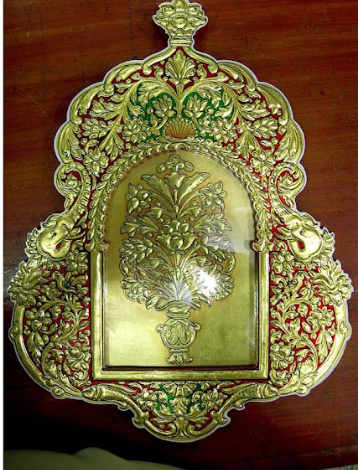
{Prelims – MISC – 2023/08/05} Bazball
- Context (TH): Bazball has dominated the conversation in the 2023 Ashes Test cricket.
- Bazball is an approach to batting in Test cricket. It involves taking chances more frequently than is the norm, aiming to score as quickly as possible at the cost of losing wickets more often.




![PMF IAS Environment for UPSC 2022-23 [paperback] PMF IAS [Nov 30, 2021]…](https://pmfias.b-cdn.net/wp-content/uploads/2024/04/pmfiasenvironmentforupsc2022-23paperbackpmfiasnov302021.jpg)


